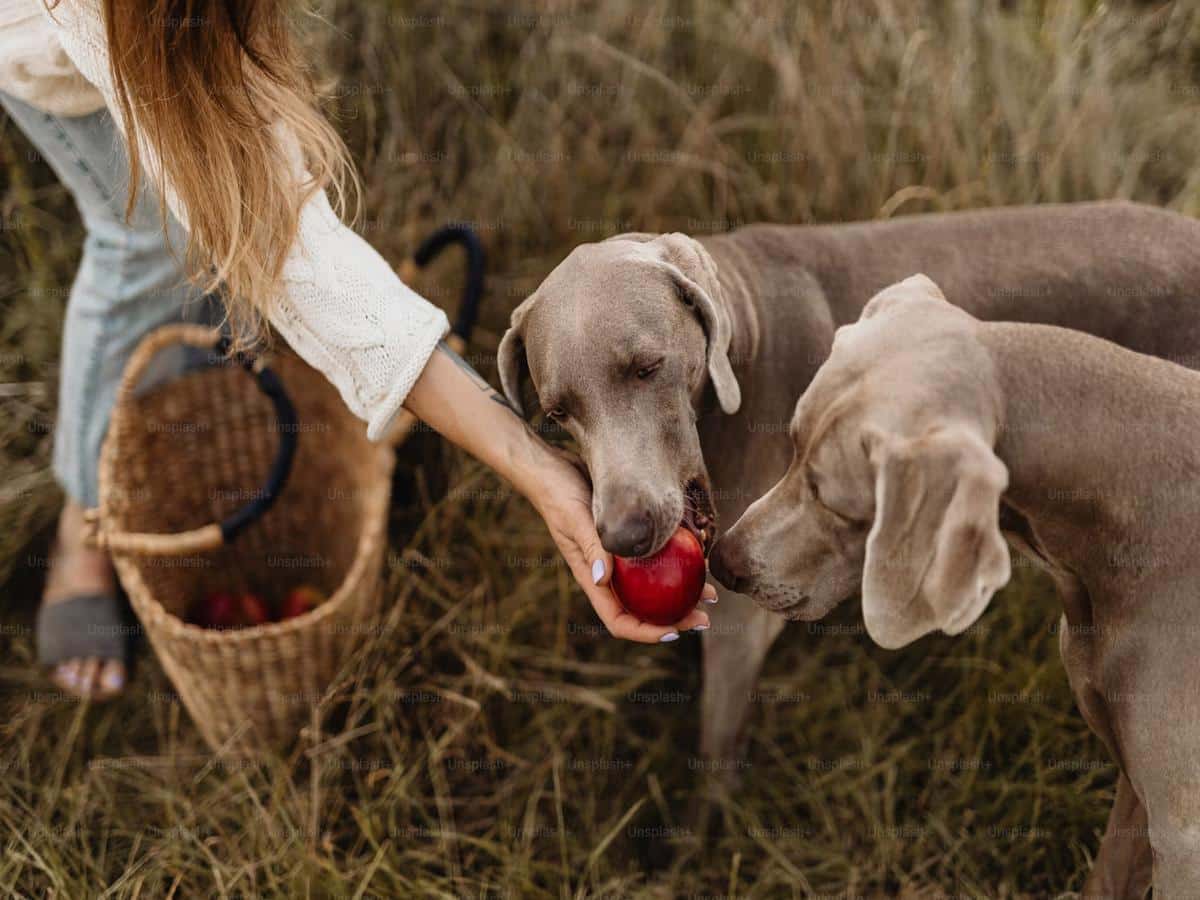Yes, research has shown that dogs eat apples safely without any health implications. However, eating the apple seeds in large quantities can be fatal to your dog. Apple seeds contain cyanide which can be very hazardous to dogs.
Understanding the intricacies of canine nutrition is paramount. Among the plethora of foods available, apples stand out as a particularly intriguing option for our canine friends. From their enticing crunch to their potential health benefits, let’s uncover the allure of apples in the canine diet.
The Nutritional Value of Apples
Apples are not just delicious; they pack a nutritional punch too. Bursting with essential vitamins and minerals, fibre, antioxidants, and phytonutrients, they offer a wholesome option for canine consumption.
Additionally, within the crisp flesh of apples lie a treasure trove of vitamins, including vitamin A, vitamin C, and various B vitamins. These nutrients play vital roles in supporting overall health, from vision and immune function to energy metabolism.
Apples are renowned for their high-fibre content, making them a valuable addition to a dog’s diet. Furthermore, fibre promotes digestive health, regulates bowel movements, and helps maintain a healthy weight by promoting satiety.
They are rich in antioxidants and phytonutrients. Apples offer protection against oxidative stress and inflammation, contributing to long-term health and vitality in dogs.
Understanding Canine Digestion
Dogs possess a unique digestive system tailored to their carnivorous ancestry. Unlike humans, they have shorter digestive tracts optimized for processing animal proteins efficiently.
Dogs share some similarities in digestion with humans, such as the breakdown of food in the stomach and small intestine. However, their digestive physiology varies in terms of nutrient absorption and processing plant-based foods.
Although they are primarily carnivorous, dogs can digest fruits and vegetables to some extent. However, their digestive systems may not efficiently break down certain plant components, leading to potential issues if consumed in large quantities.
Benefits of Apples for Dogs
The crisp texture of apples acts as a natural toothbrush, helping to remove plaque and freshen breath in dogs. Chewing on apple slices can promote dental hygiene and reduce the risk of periodontal disease.
The fibre content in apple aids in digestion by promoting regular bowel movements and supporting gut health. It can reduce constipation and regulate digestive function in dogs, promoting overall gastrointestinal well-being.
Apples are low in calories and fat and high in fibre, making them an excellent choice for dogs watching their weight. Including apples as a low-calorie snack can help dogs feel full without consuming excessive calories.
Furthermore, the antioxidants and phytonutrients found in apples contribute to a robust immune system in dogs. These compounds help neutralize free radicals, reduce inflammation, and support cellular health, enhancing the body’s defence mechanisms.
Risks and Considerations
Firstly, apple seeds contain amygdalin, a compound that releases cyanide when your dog digests it. While the small amount of cyanide in apple seeds is unlikely to harm dogs, eating large quantities may pose a risk.
Secondly, it is worth noting that some dogs may be allergic to apples or develop sensitivities to certain compounds within the fruit. As a result, allergic reactions can manifest as itching, swelling, gastrointestinal upset, or respiratory issues.
Lastly, consuming excessive amounts of apples or consuming them too quickly can lead to digestive upset in dogs. Symptoms may include diarrhoea, vomiting, abdominal discomfort, or changes in stool consistency.
Precautions for Feeding Apples to Dogs
To mitigate the risk of cyanide exposure, it’s advisable to remove apple cores and seeds before feeding them to dogs. The core and seeds should be discarded safely to prevent accidental ingestion.
While apples can be a healthy addition to a dog’s diet, they should be fed in moderation. Excessive consumption can lead to gastrointestinal issues or an imbalance in nutrient intake.
Additionally, when introducing apples into a dog’s diet for the first time or increasing the frequency of consumption, it’s essential to monitor for any signs of adverse reactions. If symptoms persist or worsen, veterinary attention should be sought.
Can Dogs Eat Different Types of Apples?
Yes, dogs can eat different types of apples. The most common varieties of red apples, such as Fuji, Gala, and Red Delicious, are generally safe for dogs to eat. Their sweet flavour and crisp texture make them a popular choice for canine consumption.
At the same time, Green apples, including Granny Smith and Golden Delicious varieties, are also safe for dogs in moderation. However, their tartness may not appeal to all dogs, so it’s best to introduce them gradually.
While organic apples may offer fewer pesticide residues, both organic and conventionally grown apples are safe for dogs when properly washed and prepared. Choose apples that are fresh, firm, and free from visible signs of spoilage.
Safe Preparation Methods
When preparing apples for dogs, it’s essential to remove the core, seeds, and stem to prevent cyanide exposure. Slices or small chunks of apple can be served raw or cooked, depending on the dog’s preferences and dietary needs.
Introducing Apples into Your Dog’s Diet
When introducing apples into a dog’s diet for the first time, start with small amounts to assess their tolerance and preference. Monitor for any signs of digestive upset or allergic reactions before increasing the quantity.
You can serve apples as a standalone snack or incorporate them into a balanced diet as part of a meal. They can be served raw, cooked, or frozen for added variety and texture.
Additionally, apples can be used to create delicious homemade treats for dogs. These treats include apple slices dipped in peanut butter or frozen apple cubes for a refreshing summer snack. Get creative with recipes to keep your canine companion excited about apples.
Signs of Allergic Reactions When Dogs Eat Apples
Some signs of allergic reactions when dogs eat apples include itching, scratching, redness, swelling, hives, or gastrointestinal upset. If your dog displays any of these symptoms after consuming apples, discontinue feeding and consult your veterinarian.
Also digestive upset may manifest as diarrhoea, vomiting, abdominal discomfort, flatulence, or changes in stool consistency. If these symptoms persist or worsen, seek veterinary advice to rule out underlying health issues.
Frequently Asked Questions About Dogs and Apples
Can Dogs Eat Apple Skin?
Yes, dogs can safely eat apple skin. However, it is vital you thoroughly wash it to remove any pesticide residues or contaminants. The skin contains valuable nutrients and fibre that contribute to overall health.
Can Dogs Eat Apple Cores?
No. Apple cores contain apple seeds, which contain small amounts of cyanide that are harmful to your dog. To prevent cyanide exposure, always remove the core and seeds before feeding apples to dogs.
Can Dogs Have Apple Seeds?
NO. Apple seeds contain amygdalin, a compound that releases cyanide when digested. While the small amount of cyanide in apple seeds is unlikely to harm dogs, ingestion of large quantities may pose a risk.
Can Dogs Eat Cooked Apples?
Yes, dogs can safely eat cooked apples, which may be easier to digest for some dogs. Cooking apples can also enhance their flavour and aroma, making them more appealing to picky eaters.
Can Dogs Eat Applesauce?
Unsweetened applesauce can be a safe and tasty treat for dogs in moderation. However, it’s essential to check the ingredients and avoid applesauce with added sugars, sweeteners, or other harmful additives.
Can Puppies Eat Apples?
Puppies can safely eat apples in moderation, provided they are introduced gradually and in small amounts. Monitor for any signs of digestive upset or allergic reactions when introducing apples to puppies.
Alternatives to Apples for Dogs
In addition to apples, there are several other fruits that dogs can enjoy as part of a balanced diet. Some safe fruit options for dogs include bananas, blueberries, strawberries, watermelon, and cantaloupe.
Vegetables can also make nutritious snacks for dogs. They provide essential vitamins, minerals, and fibre. Popular vegetable options for dogs include carrots, cucumbers, green beans, broccoli, and sweet potatoes.
Get creative in the kitchen and whip up delicious homemade treats for your canine companion using fruits and vegetables. From frozen fruit popsicles to vegetable chips, the possibilities are endless when it comes to healthy and tasty snacks for dogs.
Expert Opinions and Studies
Veterinarians and canine nutritionists emphasize the importance of a balanced diet for dogs, including a variety of fruits and vegetables in moderation. They recommend consulting with a veterinarian before introducing new foods into a dog’s diet, especially if they have underlying health conditions or dietary restrictions.
There is limited scientific research specifically on dogs and apples. However, some breeders suggests that apples can be a safe and nutritious addition to a dog’s diet when fed in moderation. Further studies are needed to explore the potential health benefits and risks associated with apple consumption in dogs.
Conclusion
Apples can be a safe and enjoyable treat for dogs when fed in moderation and prepared appropriately. Rich in essential nutrients and low in calories, they offer numerous health benefits for canine companions of all ages and breeds.
As responsible pet owners, it’s essential to prioritize the health and well-being of our canine friends by offering a balanced diet that includes a variety of nutritious foods. When introducing new foods such as apples, it’s crucial to monitor for any signs of adverse reactions and seek veterinary advice if necessary.
So, the next time you reach for a crisp apple, consider sharing a slice with your furry friend. With proper preparation and moderation, you can delight in the joy of watching your dog enjoy this wholesome and delicious fruit as much as you do.






